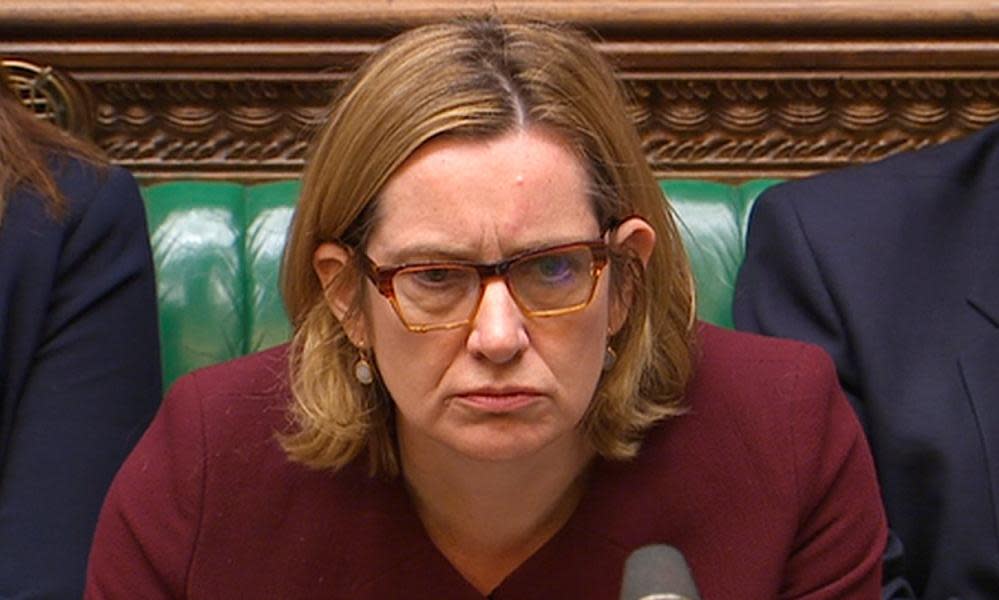Amber Rudd urged to resign over immigrant removal targets

Amber Rudd faced fresh calls to resign after admitting the Home Office set strict local targets for removing migrants who were in the UK illegally, having previously told MPs her department did not set targets.
The home secretary was hauled back in front of MPs in the House of Commons to answer an urgent question from Labour’s Diane Abbott, after Home Office documents revealed targets were set for voluntary removals.
MPs have said the targets could have led enforcement officers to target “low-hanging fruit” – people living in the UK legally but without the correct documents, like many of the Windrush generation.
Rudd said the Home Office had been “using local targets for internal performance management” but said she would review them.
“I have never agreed there should be specific removal targets and I would never support a policy that puts targets ahead of people,” she said.
“These were not published targets against which performance was assessed. But they were used inappropriately. I am clear they will have to change.”
Rudd said she had requested a full briefing on how performance was assessed, including the use of targets, and that she would update MPs afterwards.
“I do not want us to be run by a target culture. I want to make sure the individual is at the heart of any decision,” she said.
Asked by Labour MP Rachel Maskell who was running the department if Rudd did not know about the targets, the home secretary said: “I accept the criticism on the issue ... that’s why I’m in the house today setting out the changes I’m going to make ... to continue to develop the confidence of everybody involved.”
Abbott said the revelations were part of a long-running saga of Home Office mistreatment of migrants, including the Windrush families. “Isn’t it time the home secretary considered her honour and resigned?” she said.
Other Labour and SNP MPs echoed calls for Rudd’s resignation but her position was bolstered by Tory MPs who turned out in force to support her. Cabinet ministers Michael Gove and Sajid Javid sat beside her on the frontbench for her statement.
Conservative MP Nicholas Soames said Rudd had “the total support of this side of the house in trying to resolve a very difficult legacy issue” to cheers from other Tory MPs.
Pressed by Labour’s Paula Sherriff, Rudd said she did not intend to step aside. “I do take seriously my responsibility but I do think I am the person who can put it right,” she said.
Rudd’s appearance in the Commons followed an appearance before the home affairs select committee, where she was asked whether her department had regional targets, after an immigration union official claimed they existed.
Rudd said she was not familiar with the suggestion that regional targets were in place. “We don’t have targets for removals … If you are asking me if there are numbers of people we expect to be removed, that’s not how we operate,” she said.
The Home Office immigration chief, Glyn Williams, also told MPs that targets did not exist.
However, an inspection report from 2015 seen by the Guardian reveals that the Home Office set a target in 2015 of 12,000 voluntary departures of people regarded as having no right to stay in the UK. It is not clear whether the target is still in force.
The figure was a 60% increase on the previous year, prompting concerns that immigration officials may have been under so much pressure to meet the target that legal migrants who struggled to prove their status could have been caught up in the crackdown.
Yvette Cooper, the Labour chair of the Commons home affairs committee, said it was “deeply disappointing that the home secretary did not know the facts” when she spoke to the committee on Wednesday.
Theresa May’s spokesman insisted removal targets was a concept which “goes back over a number of decades”, and cited ones imposed by Labour governments from 1998 to 2010, although these were aimed at more specific areas such as asylum seekers and foreign prisoners.
Asked if May supported the principle of targets, he said: “Dealing with issues of illegal immigration and taking enforcement action has been a priority for a succession of governments.”

 Yahoo News
Yahoo News 
